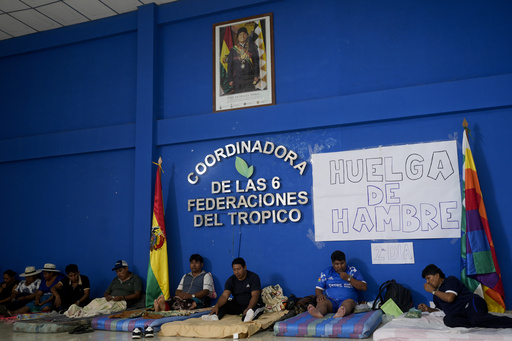
LAUCA Ñ, Bolivia — Former President Evo Morales, known for his polarizing leadership, announced on Sunday that he would continue his hunger strike until the government of his rival-turned-protégé, President Luis Arce, agrees to engage in political dialogue. This move aims to address the ongoing protests that have significantly disrupted the country, which Morales’ supporters argue stem from his unjust political targeting.
Speaking from the coca-growing region of Chapare, a pivotal area in his political career, Morales expressed his commitment to fostering improvements in the nation. He emphasized the need for an unrestricted dialogue that addresses economic and political issues. He initiated the hunger strike on Friday, hoping that international organizations would assist in bridging the gap between him and Arce.
Over the last three weeks, tensions have escalated as Morales’ supporters established roadblocks to challenge the Arce administration, which has seen accusations against Morales involving a 2016 statutory rape case. Morales, Bolivia’s first Indigenous president, maintains his innocence, stating, “My crime is being Indigenous.”
Morales’ location was reached after an arduous 11-hour journey, navigating around roadblocks and security measures that have become a common feature of protests in Bolivia’s rugged landscape. These roadblocks have sparked fears of food and fuel shortages as they hinder access to major cities, including the capital, La Paz, where living costs are already rising.
Protesters have voiced their frustrations and called for Arce’s resignation, accusing the government of failing to address their needs. One farmer supporting Morales lamented the government’s lack of solutions and expressed determination to persist until they achieve their goals.
In response to the unrest, Arce’s administration dispatched around 3,000 armed police to dismantle the protests, leading to numerous arrests. Officials reported that over 50 detainees were moved to pre-trial detention, a situation Morales decried as harsh treatment of those simply exercising their rights. “These are humble people who were presented as terrorists,” he stated.
The political crisis intensified when Morales claimed that gunmen targeted his convoy, suggesting an assassination attempt orchestrated by the government. However, government officials refuted this, alleging that Morales’ vehicle failed to stop at a security checkpoint, resulting in police firing warning shots.
With mounting frustrations, the situation further escalated as Arce’s government accused Morales’ supporters of taking over military barracks in Chapare, leading to claims of hostage situations. Morales denied these allegations, asserting that the demonstrations were peaceful and focused on fulfilling their economic and political demands.
The government’s minister, Eduardo Del Castillo, acknowledged the possibility of negotiations with Morales but expressed skepticism regarding his intentions. “Morales doesn’t care about the country, he cares about himself,” Del Castillo stated, suggesting that Morales is capitalizing on the political chaos to stir unrest.
This rise in tensions is a manifestation of the deeper conflicts within the Movement Toward Socialism party, further complicated by potential legal actions against Morales related to past accusations of misconduct when he was in office. Morales’ allies dismiss these allegations as politically motivated efforts to thwart his potential return to power in upcoming elections.
In a broader context, Morales has indicated his desire to return to political prominence, claiming that the citizens wish for his leadership due to the stability and prosperity experienced during his administration from 2006 to 2019. He promised to reinvigorate the economy through collaborations with emerging economies and plans to involve Bolivia in BRICS, an arrangement aimed at enhancing economic independence.
While the current Bolivian government has yet to respond to Morales’ calls for dialogue, the former leader remains firm in his intentions. Even at 65, he shows his preparedness for the hunger strike, citing his physical endurance and commitment to his cause. “I do a lot of sports,” Morales stated, demonstrating his resolve to continue this protest for as long as necessary.
